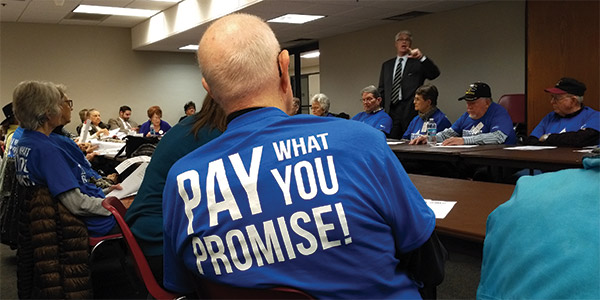Lutheran Senior Services residents are meeting the state’s Medicaid crisis head-on.
There is a growing awareness throughout Missouri of the state’s Medicaid crisis – and of recent efforts by Lutheran Senior Services to fix it. The movement started in January when groups of seniors began gathering at LSS communities to learn about the underfunding of Medicaid.
Within weeks, they had sent more than 1,000 hand signed letters to their lawmakers. Turns out, it was only the beginning.
The issue that continues to rile seniors about Medicaid is the $25 gap between the state’s own formula for reimbursement and the amount Missouri actually pays. Twenty-five dollars may sound like pocket change, but only until you extrapolate that amount out to include every one of Missouri’s skilled nursing residents – about 89,000 in all – and then multiply that by the number of days in a year. Twenty-five dollars is no small thing.
But the budget gap is only part of the Medicaid problem. There’s also a communication gap. A good part of the electorate is not aware of the underfunding crisis, and some legislators don’t have the information they need to make an informed decision about it. So residents from St. Louis assisted living accommodations have taken it upon themselves to close the communication gap, not only by writing letters, but by visiting their lawmakers in Jefferson City.
On March 13, LeadingAge Missouri, a trade organization for senior living providers, hosted a senior rally at the state capitol. Older adults from Lenoir Woods in Columbia and John Knox Village in Kansas City spent the day talking to their representatives in the House and Senate about Medicaid. Among the participants was one Jim Schaffner who served as Missouri’s Director of Revenue in the 1970s under Governor Hearnes. Schaffner understands how state government works. “What LSS did was great,” he said. “They went about this the right way. And Bill Bates from LeadingAge did a beautiful job distilling the message to be shared with our legislators.”
The message was “Bridge the gap for seniors,” referring to the $25 per day shortfall in the Medicaid reimbursement rate and “Pay what you promise,” referring to the actual funding of Medicaid. To get the message out, seniors wore bright blue shirts with these rally cries printed front and back. It was like having 50 walking billboards in the halls of the capitol building.
The t-shirts also proved to be door openers as seniors approached their representatives. For these older adults, their message was personal.
“Residents of our Life Plan Communities know their neighbors,” said Kent Kirkwood, Executive Director of Lenoir Woods. “They know some of them are on Medicaid, so they have a personal connection to those impacted by funding deficits.”
Kirkwood has a personal connection, too. The communities he leads serve seniors in all living levels, from Independent Living to Long Term Care. He sees the whole spectrum every day, and he connects with every one. “You can’t work with older adults and not be impacted by their stories. My residents are like family to me. I know them well.”
But, as well as Kirkwood knows his residents, he was nonetheless surprised by their deep knowledge of Medicaid and the passion with which they shared that knowledge with lawmakers on their trip to the capitol. Some used the opportunity to remind lawmakers of their voting power. They know they represent one of the strongest voting blocs in the state.
Kirkwood was also surprised by the warm reception of lawmakers, who left the House Chamber to meet with seniors in the hallways and to flip through literature on House Bill 2068. The corresponding Senate Bill 818 to fund Medicaid passed unanimously in late February. Now seniors are hoping for a landslide victory in the House.
“We were thrilled when we heard that the Senate bill passed 31-0. That almost never happens,” said John Kotovsky, CEO of Lutheran Senior Services, the parent company of Lenior Woods. “It just reinforces what I’ve been saying all along: Funding Medicaid is not a political issue. It’s a moral one. Caring for our most frail citizens is quite simply the right thing to do.”
Jim Schaffner and other LSS residents agree. Their shirts say it all. Now it’s time for their lawmakers to answer.
you promise,” referring to the actual funding of Medicaid. To get the message out, seniors wore bright blue shirts with these rally cries printed front and back. It was like having 50 walking billboards in the halls of the capitol building.
The t-shirts also proved to be door openers as seniors approached their representatives. For these older adults, their message was personal.
“Residents of our Life Plan Communities know their neighbors,” said Kent Kirkwood, Executive Director of Heisinger Bluffs and Lenoir Woods. “They know some of them are on Medicaid, so they have a personal connection to those impacted by funding deficits.”
Kirkwood has a personal connection, too. The communities he leads serve seniors in all living levels, from Independent Living to Long Term Care. He sees the whole spectrum every day, and he connects with every one. “You can’t work with older adults and not be impacted by their stories. My residents are like family to me. I know them well.”
But, as well as Kirkwood knows his residents, he was nonetheless surprised by their deep knowledge of Medicaid and the passion with which they shared that knowledge with lawmakers on their trip to the capitol. Some used the opportunity to remind lawmakers of their voting power. They know they represent one of the strongest voting blocs in the state.
Kirkwood was also surprised by the warm reception of lawmakers, who left the House Chamber to meet with seniors in the hallways and to flip through literature on House Bill 2068. The corresponding Senate Bill 818 to fund Medicaid passed unanimously in late February. Now seniors are hoping for a landslide victory in the House.
“We were thrilled when we heard that the Senate bill passed 31-0. That almost never happens,” said John Kotovsky, CEO of Lutheran Senior Services, the parent company of Heisinger Bluffs and Lenior Woods. “It just reinforces what I’ve been saying all along: Funding Medicaid is not a political issue. It’s a moral one. Caring for our most frail citizens is quite simply the right thing to do.”
Jim Schaffner and his fellow residents agree. Their shirts say it all. Now it’s time for their lawmakers to answer.


